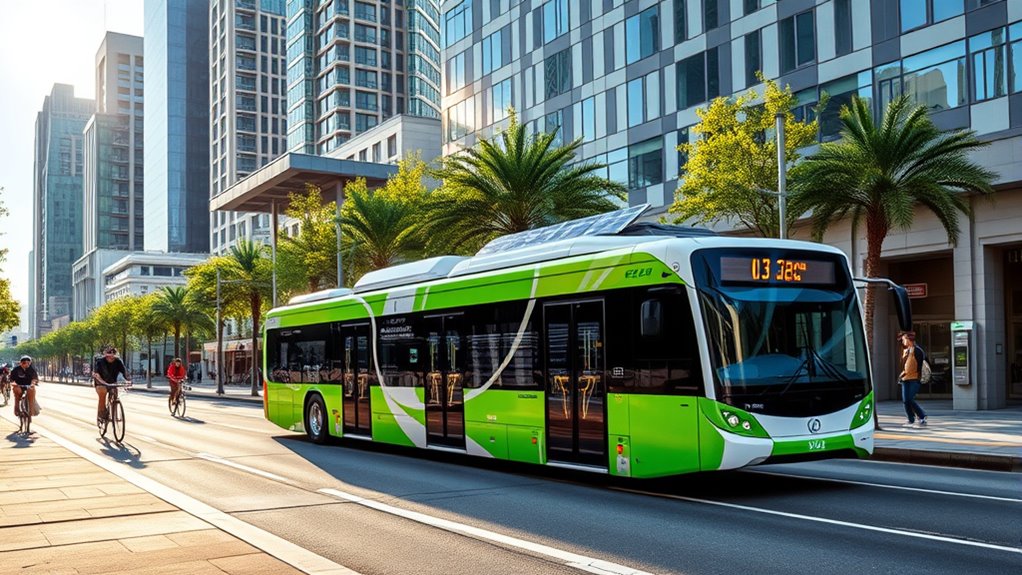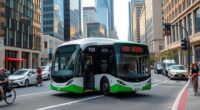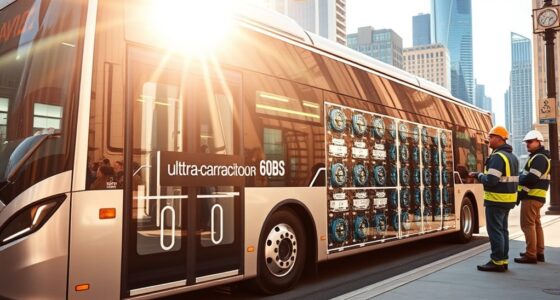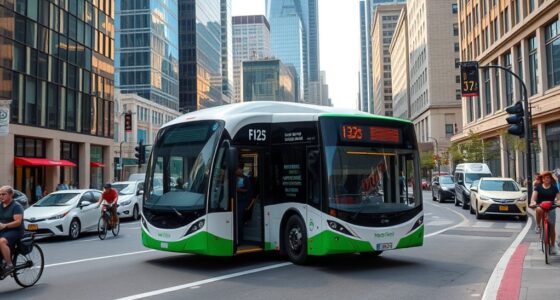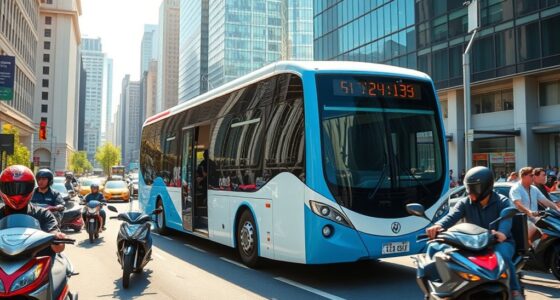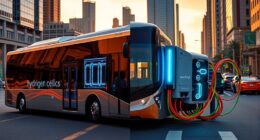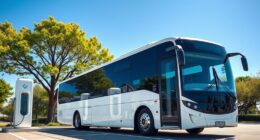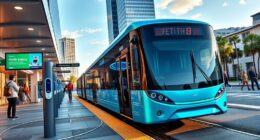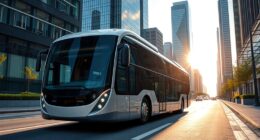Electric buses are key to the broader shift toward sustainable transportation by reducing emissions, improving air quality, and lowering operating costs. They operate quietly, use regenerative braking, and require less maintenance, making cities cleaner and more efficient. As technology advances and infrastructure expands, electric buses play a crucial role in helping communities meet climate goals. Keep exploring to discover how these innovations are transforming urban mobility for a greener future.
Key Takeaways
- Electric buses reduce greenhouse gas emissions and air pollutants, supporting broader efforts to lower transportation’s environmental impact.
- They integrate with renewable energy sources, advancing sustainable, low-carbon urban mobility solutions.
- Electric buses promote cleaner, quieter transportation, aligning with city goals for healthier, more livable environments.
- Their operational efficiencies and charging innovations enhance the overall sustainability of transit systems.
- Widespread adoption of electric buses encourages shifts toward smarter, eco-friendly transportation infrastructure.
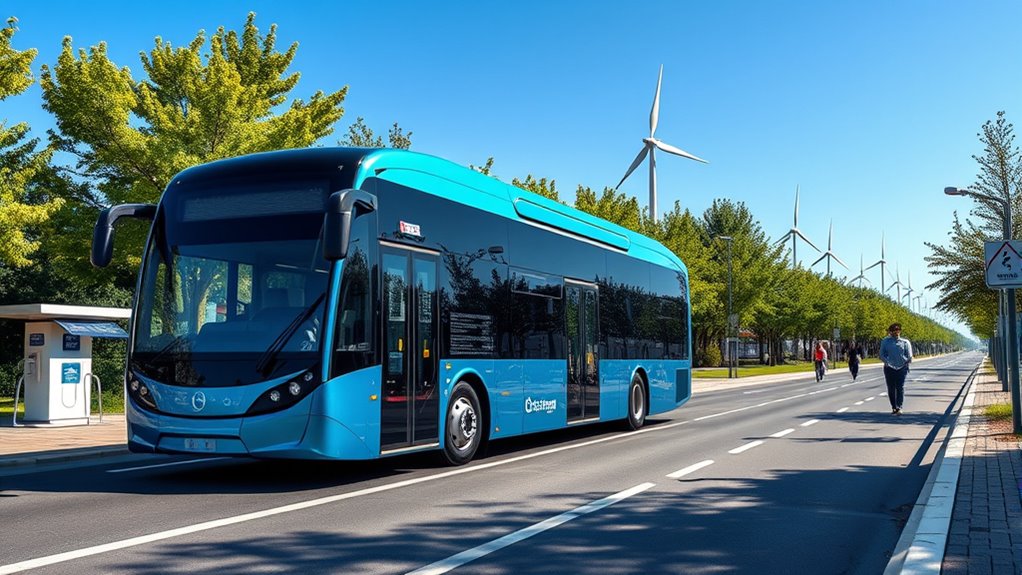
Have you ever wondered how cities are transforming their transportation systems to become cleaner and more sustainable? The answer lies partly in the rise of electric buses, a key component of modern urban mobility. These buses produce no tailpipe emissions, which means they don’t release greenhouse gases or pollutants that harm air quality. This shift helps cities combat air pollution while reducing their carbon footprint.
Electric buses are transforming cities by eliminating tailpipe emissions and promoting sustainable urban mobility.
Unlike traditional diesel buses, electric models are more operationally efficient, delivering better performance with less fuel. Thanks to regenerative braking systems, they convert braking energy into electricity, recharging their batteries and extending their range. Plus, they operate quietly, creating a more comfortable environment for passengers and reducing noise pollution in busy city centers.
Maintenance is also simplified because electric buses have fewer moving parts, leading to lower repair costs and less downtime. This increased efficiency isn’t just good for the environment; it also brings noteworthy financial benefits. Electric buses cost about half as much to operate as diesel buses, mainly because electricity is cheaper than fuel. They also require less maintenance, saving cities money over the long term.
Their higher energy efficiency further reduces operational expenses, and with favorable utility policies, the cost of charging can decrease even more. These financial advantages make electric buses an attractive choice for cities aiming to balance sustainability with budget constraints.
On an environmental level, electric buses dramatically reduce greenhouse gas emissions, helping cities meet climate goals. By replacing diesel-powered vehicles, urban areas can eliminate millions of tons of emissions annually, markedly improving air quality and public health.
Without diesel exhaust, communities experience fewer particulate pollutants, which are linked to respiratory problems. Electric buses also help prevent ground-level ozone formation, a harmful pollutant that forms when emissions react with sunlight. The proven ability of electric buses to cut emissions makes them essential in the broader movement toward sustainable transportation.
As battery technology improves, these buses gain longer ranges and faster charging times, easing integration into existing transit networks. The development of advanced charging infrastructure further supports their widespread adoption, making fleet electrification more feasible.
Additionally, the integration of renewable energy sources like solar and wind power for charging stations can further reduce the carbon footprint of electric bus fleets. Electric buses play a pivotal role in fostering sustainable mobility by encouraging more public transit use due to their quiet, clean operation. They help cities comply with stricter environmental regulations and climate commitments, ultimately contributing to healthier, more livable urban environments.
As technological advancements continue, electric buses will become even more efficient and accessible. With lower operational costs, reduced emissions, and improved passenger experience, they stand at the forefront of the shift toward cleaner, smarter, and more sustainable urban transportation systems.
Frequently Asked Questions
How Do Electric Buses Impact Local Air Quality?
Electric buses substantially improve your local air quality by eliminating diesel exhaust emissions, which cause pollution and health issues. They reduce particulate matter and ozone-forming pollutants, leading to cleaner, healthier air in your community.
This change also lowers greenhouse gases and noise pollution, making your urban environment more pleasant and safe. By choosing electric buses, you help create a cleaner, more sustainable city that benefits everyone’s health and well-being.
What Are the Long-Term Cost Savings of Electric Buses?
Imagine your transportation costs shrinking like ice melting in the sun. Electric buses can save you up to $400,000 in fuel and $125,000 in maintenance over their lifetime.
Their longer lifespan, energy efficiency, and tax incentives make the investment pay off in about five years.
With fewer parts to replace and lower energy costs, you’ll enjoy long-term savings while helping the environment—making your transit system smarter and greener.
How Do Electric Buses Compare to Traditional Buses in Maintenance?
You’ll find that electric buses generally cost less to maintain than traditional diesel buses. They’ve a simpler design with fewer mechanical parts, so there’s less need for repairs. You won’t need oil changes, and the regenerative braking extends brake life.
Plus, they require less labor for maintenance. However, you’ll need to oversee batteries, maintain charging stations, and guarantee technicians have specialized training for electric systems.
Are Electric Buses Suitable for Rural or Less-Developed Areas?
Think of electric buses as a promising bridge to sustainable transit in rural areas. You get major benefits like cleaner air, quieter streets, and long-term cost savings.
While upfront costs and infrastructure challenges exist, government incentives and tech improvements make electric buses more viable. If you’re willing to navigate initial hurdles, they can transform rural transportation, making communities healthier, more connected, and ready for a greener future.
What Are the Main Challenges in Adopting Electric Bus Fleets?
You face several challenges when adopting electric bus fleets. You need sufficient charging infrastructure, but many locations lack enough stations.
Grid capacity can be insufficient, causing power issues. Operational hurdles include limited range and long charging times.
Financially, upfront costs are high, and infrastructure expenses add up. Plus, training your workforce and managing fleets efficiently require planning.
Overcoming these obstacles demands strategic investment, technological advancements, and strong partnerships to successfully shift to electric buses.
Conclusion
Embracing electric buses is like planting seeds for a greener future; with each ride, you’re helping to clear the air and reduce emissions. As the saying goes, “A journey of a thousand miles begins with a single step.” By choosing electric, you’re taking that step toward sustainable transportation. Together, we can pave the way for cleaner cities and healthier communities—one bus at a time.
